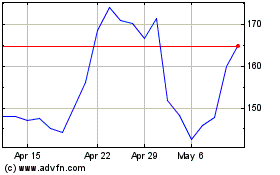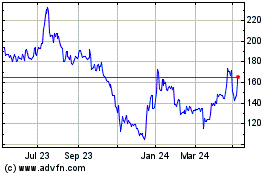By Costas Paris
Oceangoing shipping companies are keeping commerce moving around
the world as governments try to keep their staggering economies
propped up and supplies heading to increasingly strained
communities.
But many operators are going into survival mode themselves, as
the coronavirus pandemic takes a toll on trade.
"Demand is caving and supply chains are in distress," said
George Lazaridis, head of research at Greece-based Allied
Shipbroking. "Nobody knows when restrictions will be lifted and the
industry is in a battle for survival."
Moody's Investors Service sent a grim warning sign of the
troubles spreading through shipping when the firm cut the ratings
outlook for Denmark's A.P. Moller-Maersk A/S, the world's biggest
boxship operator by capacity, from stable to negative.
Many transportation operations, including port cargo handlers
and trucking companies and railroads that move goods inland, are
considered essential businesses in nations that now are locking
down business.
Unlike airlines, which could be set to gain billions of dollars
in bailout funds, most shipping companies can't count on financial
relief from governments, however. Much of the world's commercial
cargo fleet operates under a variety of flags and already enjoys
substantial tax benefits.
Many of the world's shipping companies are scrambling to adjust
to the new world.
Bulk carriers, the operators that move coal, iron ore, wheat and
other commodities, are coping with low freight rates and slipping
demand. China, the world's biggest commodities importer,
drastically cut down inbound cargoes of iron ore and coal in the
first quarter.
A recovery in freight rates isn't expected until late into the
second half and that is if the virus doesn't engulf big exporters
like Brazil and Australia. The average daily freight rate for large
bulkers stands at around $8,000 a day, less than half the
break-even level.
The specialized car carriers that haul automobiles and other
vehicles around the world are reeling as automotive factories shut
down. Norway's Wallenius Wilhelmsen, one of the world's biggest car
carriers, last week said it would furlough about 2,500 workers --
half of its production staff in the Americas -- and pulled 14 ships
from its fleet.
Only tanker operators appear to be weathering the pandemic
storm. Crude carriers are on a healthy run as oil importing
countries and traders are buying big amounts of oil to replenish
strategic reserves and for storage at record low prices.
Still, a recession in the global economy would sharply reduce
the demand for oil in the coming months.
For container ship carriers, the operators that move most of the
world's manufactured goods, the downturn is already here.
The carriers in that sector canceled about half of their
services out of China in the first quarter and are continuing to
"blank" sailings on major trade routes for the second quarter as
they try to preserve cash.
In January "we thought some cargo would be delayed, but things
would be OK as ports stayed open," said the chief executive of a
European ship chartering company with a fleet of two dozen vessels.
"Now, I have to let go of a quarter of my staff and I don't know
whether I'll still have a business at the end of April. "
"The virus in China alone led to more than 120 blank sailings.
The pandemic spread is likely to lead to substantially more blank
sailings than this," said Lars Jensen, chief executive of
Copenhagen-based SeaIntelligence Consulting. "If the 37% reduction
is an indication of a global demand shortfall, this means all
carriers are facing mortal risks."
Mr. Jensen expects overall container volumes to decline about
10% this year because of the pandemic, similar to the decline in
the aftermath of the 2008 financial crisis.
While big operators hold ships in storage, smaller operators
have less room to ride out the crisis.
China's supply shortage put dozens of smaller shipping companies
with niche routes from China to destinations like Japan, South
Korea and the Philippines in distress, erasing their cash
flows.
Those companies have only a handful of ships apiece but they are
critical to global trade because they shuttle containers and
commodities on regional trade lanes that feed parts and finished
goods to operators on the bigger routes.
Singapore-based Pacific International Lines, the world's
10th-biggest container line by capacity, according to maritime data
provider Alphaliner, has been selling off some assets to raise
cash. The company has been seeking to stave off creditors amid a
heavy debt load.
A.P. Moller-Maersk's main Maersk Line business went into 2020
with nearly $4.8 billion in cash. But Moody's in downgrading Maersk
said that won't insulate the carrier from the factory closures and
protectionist actions spreading around the world.
"The shipping sector in general and container shipping sector in
particular are dependent on world trade and activity demand for
goods from industrial companies as well as consumers," Moody's said
in its report Tuesday.
In Germany, Alfred Hartmann, the head of the country's big
shipowners' association, warned that repayment of some shipping
loans "will turn out to be problematic."
"Our focus going forward will be costs, further deleveraging,
and [to] make sure that we keep enough cash," Rolf Habben Jansen,
chief executive of Hapag-Lloyd AG, said in a March 20 investor
conference call.
The German container line earned a $418 million net profit in
2019, but Mr. Jansen said that last year now seems "a very long
time ago."
Write to Costas Paris at costas.paris@wsj.com
(END) Dow Jones Newswires
April 02, 2020 05:44 ET (09:44 GMT)
Copyright (c) 2020 Dow Jones & Company, Inc.
Hapag-Lloyd (TG:HLAG)
Historical Stock Chart
From Mar 2024 to Apr 2024

Hapag-Lloyd (TG:HLAG)
Historical Stock Chart
From Apr 2023 to Apr 2024
